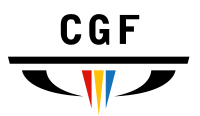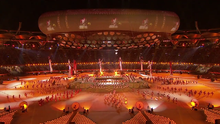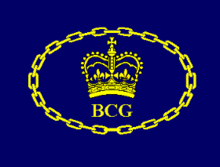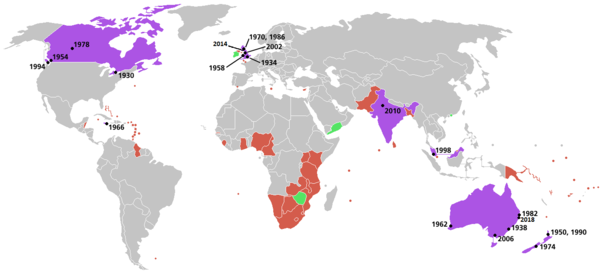- Commonwealth Games
-
Commonwealth Games 
Commonwealth Games Federation seal, adopted in 2001Motto Humanity – Equality – Destiny Headquarters  London, England,
London, England,President  Prince Tunku Imran
Prince Tunku ImranWebsite Commonwealth Games Federation The Commonwealth Games is an international, multi-sport event involving athletes from the Commonwealth of Nations. The event was first held in 1930 and takes place every four years.
It was initially known as the British Empire Games and was renamed to the British Empire and Commonwealth Games in 1954 and the British Commonwealth Games in 1970, before finally gaining its current title for the 1978 edition. The Games are overseen by the Commonwealth Games Federation (CGF), which also controls the sporting programme and selects the host cities. A host city is selected for each edition and eighteen cities in seven countries have hosted the event.
As well as many Olympic sports, the Games also include some sports that are played mainly in Commonwealth countries, such as lawn bowls, rugby sevens and netball.[1] Only six teams have attended every Commonwealth Games: Australia, Canada, England, New Zealand, Scotland and Wales. Australia has been the highest achieving team for eleven games, England for seven and Canada for one.
Although there are 54 members of the Commonwealth of Nations, 71 teams participate in the Commonwealth Games as a number of British overseas territories, Crown dependencies, and island states compete under their own flag. The four Home Nations of the United Kingdom – England, Scotland, Wales and Northern Ireland – also send separate teams.
Contents
History
A sporting competition bringing together the members of the British Empire was first proposed by the Reverend Astley Cooper in 1891 when he wrote an article in The Times suggesting a "Pan-Britannic-Pan-Anglican Contest and Festival every four years as a means of increasing the goodwill and good understanding of the British Empire".
In 1911, the Festival of the Empire was held in London to celebrate the coronation of King George V. As part of the festival an Inter-Empire Championships was held in which teams from Australia, Canada, South Africa and the United Kingdom competed in events such as boxing, wrestling, swimming and athletics.
In 1928, Melville Marks Robinson of Canada was asked to organise the first British Empire Games. The first Games were held in 1930 in Hamilton, Ontario, Canada. The name changed to British Empire and Commonwealth Games in 1954, to British Commonwealth Games in 1970 and assumed the current name of the Commonwealth Games in 1978.[2]
At the 1930 games, women competed in the swimming events only.[3] From 1934, women also competed in some athletics events[citation needed].
The Empire Games flag was donated in 1931 by the British Empire Games Association of Canada. The year and location of subsequent games were added until the 1950 games. The name of the event was changed to the British Empire and Commonwealth Games and the flag was retired as a result.
Traditions
- From 1930 until 1950, the parade of nations was led by a single flagbearer carrying the Union Flag.
- Since 1958, the Queen's Baton Relay has taken place, in which athletes carry a baton from Buckingham Palace to the games opening ceremony. This baton has within it Queen Elizabeth II's message of greeting to the athletes. The baton's final bearer is usually a famous sporting personage of the host nation.
- All other nations march in English alphabetical order, except that the first nation marching in the Parade of Athletes is the host nation of the previous games, and the host nation of the current games marches last. In 2006 countries marched in alphabetical order in geographical regions.
 The Big helium aerostat with traditional Indian Rajasthani puppets attached, during the 2010 Commonwealth Games opening ceremony
The Big helium aerostat with traditional Indian Rajasthani puppets attached, during the 2010 Commonwealth Games opening ceremony
- Three national flags fly from the stadium on the poles that are used for medal ceremonies: Previous host nation, Current host nation, Next host nation.
- The military is more active in the Opening Ceremony than in the Olympic Games. This is to honour the British Military traditions of the Old Empire.
Editions
The first edition of the event was the 1930 British Empire Games and eleven nations took part. The quadrennial schedule of the games was interrupted by World War II and the 1942 Games (set to be held in Montreal) and the 1946 Games were abandoned.[4] The games were continued in 1950 and underwent a name change four years later with the first British Empire and Commonwealth Games in 1954.[2] Over 1000 athletes participated in the 1958 Games as over thirty teams took part for the first time.[5]
The event was briefly known as the British Commonwealth Games for the 1970 and 1974 editions and the 1978 Games, held in Edmonton, Canada, were the first to be held under the title of the "Commonwealth Games".[2] The Edmonton event marked a new high as almost 1500 athletes from 46 countries took part.[5]
Participation at the 1986 Games was affected by a boycott by some African and Caribbean nations in protest to the participation of New Zealand, following the All Blacks Rugby tour of Apartheid era South Africa in 1985, but the Games rebounded and continued to grow thereafter. The 1998 Commonwealth Games in Kuala Lumpur, Malaysia saw the sporting programme grow from 10 to 15 sports as team sports were allowed for the first time.[2] Participation also reached new levels as over 3500 athletes represented 70 teams at the event. At the Games in Melbourne in 2006, over 4000 athletes took part in sporting competitions.[5]
The three nations to have hosted the games the most number of times are Australia (5), Canada (4) and New Zealand (3). Furthermore, six editions have taken place, or will take place, in the countries within the United Kingdom (Scotland 3, England 2 and Wales 1). Two cities have held the games on multiple occasions: Auckland (1950 and 1990), and Edinburgh (1970 and 1986).
Games Year Host Dates Sports Events Nations Competitors British Empire Games I 1930  Hamilton, Canada
Hamilton, Canada16 – 23 August 6 59 11 400 II 1934  London, England
London, England4 – 11 August 6 68 16 500 III 1938  Sydney, Australia
Sydney, Australia5 – 12 February 7 71 15 IV 1950  Auckland, New Zealand
Auckland, New Zealand4 – 11 February 9 88 12 British Empire and Commonwealth Games V 1954  Vancouver, Canada
Vancouver, Canada30 July – 7 August 9 91 24 VI 1958  Cardiff, Wales
Cardiff, Wales18 – 26 July 9 94 36 VII 1962  Perth, Australia
Perth, Australia22 November – 1 December 9 104 35 VIII 1966  Kingston, Jamaica
Kingston, Jamaica4 – 13 August 9 110 34 British Commonwealth Games IX 1970  Edinburgh, Scotland
Edinburgh, Scotland16 – 25 July 9 121 42 X 1974  Christchurch, New Zealand
Christchurch, New Zealand24 January – 2 February 9 121 38 Commonwealth Games XI 1978  Edmonton, Canada
Edmonton, Canada3 – 12 August 10 128 46 XII 1982  Brisbane, Australia
Brisbane, Australia30 September — 9 October 10 142 46 XIII 1986  Edinburgh, Scotland
Edinburgh, Scotland24 July – 2 August 10 163 26 XIV 1990  Auckland, New Zealand
Auckland, New Zealand24 January – 3 February 10 204 55 XV 1994  Victoria, Canada
Victoria, Canada18 – 28 August 10 217 63 XVI 1998  Kuala Lumpur, Malaysia
Kuala Lumpur, Malaysia11 – 21 September 15 213 70 XVII 2002  Manchester, England
Manchester, England25 July – 4 August 171 281 72 XVIII 2006  Melbourne, Australia
Melbourne, Australia15 – 26 March 162 245 71 XIX 2010  Delhi, India
Delhi, India3 – 14 October 173 272 71 XX 2014  Glasgow, Scotland
Glasgow, Scotland23 July – 3 August XXI 2018  Gold Coast, Australia
Gold Coast, Australia4 April – 15 April XXII 2022 TBA TBA - Notes
1Includes 3 team sports 2Includes 4 team sports 3Includes 3 team sports
Total Commonwealth Games by country
Rank Country Region Editions hosted 1  Australia
AustraliaOceania 5 (1938, 1962, 1982, 2006, 2018) 2  Canada
CanadaAmericas 4 (1930, 1954, 1978, 1994) 3  New Zealand
New ZealandOceania 3 (1950, 1974, 1990) 3  Scotland
ScotlandEurope 3 (1970, 1986, 2014) 5  England
EnglandEurope 2 (1934, 2002) 6  India
IndiaAsia 1 (2010) 6  Malaysia
MalaysiaAsia 1 (1998) 6  Jamaica
JamaicaCaribbean 1 (1966) 6  Wales
WalesEurope 1 (1958) Approved sports
There are a total of 21 sports (with two multi-disciplinary sports) and a further seven para-sports which are approved by the Commonwealth Games Federation. They are categorised into three types. Core sports must be included on each programme. A number of optional sports may be picked by the host nation, which may include some team sports such as basketball. Recognised sports are sports which have been approved by the CGF but which are deemed to need expansion; host nations may not pick these sports for their programme until the CGF's requirements are fulfilled.[6]
Sport Type Years Archery Optional 1982, 2010 Association football Core 2014 Athletics Core 1930–present Badminton Core 1966–present Basketball Optional 2006 Billiards Recognised Never Boxing Core 1930–present Canoeing Recognised Never[7] Cricket Recognised 1998 Cycling Optional 1934–present Diving Optional 1930–present Fencing Recognised 1950–1970 Golf Recognised Never Gymnastics
(Artistic and Rhythmic)Optional 1978, 1990–present Handball Recognised 1930 Hockey Core 1998–present Judo Optional 1990, 2002, 2014 Lawn bowls Core 1930–present (except 1966) Life saving Recognised Never Sport Type Years Netball Core 1998–present Rowing Optional 1930, 1938–62, 1986 Rugby sevens Core 1998–present Sailing Recognised Never Shooting Optional 1966, 1974–present Softball Recognised Never Squash Core 1998–present Swimming Core 1930–present Synchronized swimming Optional 1986, 2006 Table tennis Optional 2002–present Taekwondo Optional Never Tennis Optional 2010 Ten-pin Bowling Recognised 1998 Triathlon Optional 2002, 2006, 2014 Volleyball Recognised Never Water polo Recognised 1950 Weightlifting Core 1950–present Wrestling Optional 1930–present (except 1990,1998 and 2006) Participation
Nations/dependencies that have competed
Only six teams have attended every Commonwealth Games: Australia, Canada, England, New Zealand, Scotland and Wales. Australia has been the highest scoring team for ten games, England for seven and Canada for one.
 Aden1 1962
Aden1 1962 Anguilla 1982, 1998–
Anguilla 1982, 1998– Antigua and Barbuda 1966–1970, 1978, 1994–
Antigua and Barbuda 1966–1970, 1978, 1994– Australia 1930–
Australia 1930– Bahamas 1954–1970, 1978–1982, 1990–
Bahamas 1954–1970, 1978–1982, 1990– Bangladesh 1978, 1990–
Bangladesh 1978, 1990– Barbados 1954–1966, 1970–1982, 1990–
Barbados 1954–1966, 1970–1982, 1990– Belize 1978, 1994–
Belize 1978, 1994– Bermuda 1930–1938, 1954–1982, 1990–
Bermuda 1930–1938, 1954–1982, 1990– Botswana 1974, 1982–
Botswana 1974, 1982– British Guiana2 1930–1938, 1954–1962
British Guiana2 1930–1938, 1954–1962 British Honduras3 1962–1966
British Honduras3 1962–1966 British Virgin Islands 1990–
British Virgin Islands 1990– Brunei Darussalam 1958, 1990–
Brunei Darussalam 1958, 1990– Cameroon 1998–
Cameroon 1998– Canada 1930–
Canada 1930– Cayman Islands 1978–
Cayman Islands 1978– Ceylon4 1938–1950, 1958–1970
Ceylon4 1938–1950, 1958–1970 Cook Islands 1974–1978, 1986–
Cook Islands 1974–1978, 1986– Cyprus 1978–1982, 1990–
Cyprus 1978–1982, 1990– Dominica 1958–1962, 1970, 1994–
Dominica 1958–1962, 1970, 1994– England 1930–
England 1930– Falkland Islands 1982–
Falkland Islands 1982– Fiji5 1938, 1954–1986, 1998–2006
Fiji5 1938, 1954–1986, 1998–2006 The Gambia 1970–1982, 1990–
The Gambia 1970–1982, 1990– Ghana 1958–1982, 1990–
Ghana 1958–1982, 1990– Gibraltar 1958–
Gibraltar 1958– Gold Coast6 1954
Gold Coast6 1954 Grenada 1970–1974, 1994–
Grenada 1970–1974, 1994– Guernsey 1970–
Guernsey 1970– Guyana 1966–1970, 1978–1982, 1990–
Guyana 1966–1970, 1978–1982, 1990– Hong Kong7 1934, 1954–1962, 1970–1994
Hong Kong7 1934, 1954–1962, 1970–1994 India 1934–1938, 1954–1958, 1966–1982, 1990–
India 1934–1938, 1954–1958, 1966–1982, 1990– Ireland8 1930[8]
Ireland8 1930[8] Irish Free State8 1934
Irish Free State8 1934 Isle of Man 1958–
Isle of Man 1958– Jamaica 1934, 1954–1982, 1990–
Jamaica 1934, 1954–1982, 1990– Jersey 1958–
Jersey 1958– Kenya 1954–1982, 1990–
Kenya 1954–1982, 1990– Kiribati 1998–
Kiribati 1998– Lesotho 1974–
Lesotho 1974– Malawi9 1970–
Malawi9 1970– Malaya10 1950, 1958–1962
Malaya10 1950, 1958–1962 Malaysia 1966–1982, 1990–
Malaysia 1966–1982, 1990– Maldives 1986–
Maldives 1986–
 Malta 1958–1962, 1970, 1982–
Malta 1958–1962, 1970, 1982– Mauritius 1958, 1966–1982, 1990–
Mauritius 1958, 1966–1982, 1990– Montserrat 1994–
Montserrat 1994– Mozambique 1998–
Mozambique 1998– Namibia 1994–
Namibia 1994– Nauru 1990–
Nauru 1990– Newfoundland11 1930–1934
Newfoundland11 1930–1934 New Zealand 1930–
New Zealand 1930– Nigeria 1950–1958, 1966–1974, 1982, 1990–1994, 2002–
Nigeria 1950–1958, 1966–1974, 1982, 1990–1994, 2002– Niue 2002–
Niue 2002– Norfolk Island 1986–
Norfolk Island 1986– North Borneo10 1958–1962
North Borneo10 1958–1962 Northern Ireland8 1934–1938, 1954–
Northern Ireland8 1934–1938, 1954– Northern Rhodesia12 1954
Northern Rhodesia12 1954 Pakistan 1954–1970, 1990–
Pakistan 1954–1970, 1990– Papua New Guinea 1962–1982, 1990–2010
Papua New Guinea 1962–1982, 1990–2010 Rhodesia13 1934–1950
Rhodesia13 1934–1950 Rhodesia and Nyasaland12 1958–1962
Rhodesia and Nyasaland12 1958–1962 Rwanda 2010-
Rwanda 2010- Saint Helena, Ascension and Tristan da Cunha 1982, 1998–
Saint Helena, Ascension and Tristan da Cunha 1982, 1998– Saint Kitts and Nevis (Saint Christopher-Nevis-Anguilla 1978), 1990–
Saint Kitts and Nevis (Saint Christopher-Nevis-Anguilla 1978), 1990– Saint Lucia 1962, 1970, 1978, 1994–
Saint Lucia 1962, 1970, 1978, 1994– Saint Vincent and the Grenadines 1958, 1966–1978, 1994–
Saint Vincent and the Grenadines 1958, 1966–1978, 1994– Samoa and Western Samoa 1974–
Samoa and Western Samoa 1974– Sarawak10 1958–1962
Sarawak10 1958–1962 Scotland 1930–
Scotland 1930– Seychelles 1990–
Seychelles 1990– Sierra Leone 1966–1970, 1978, 1990–
Sierra Leone 1966–1970, 1978, 1990– Singapore10 1958–
Singapore10 1958– Solomon Islands 1982, 1990–
Solomon Islands 1982, 1990– South Africa 1930–1958, 1994–
South Africa 1930–1958, 1994– South Arabia1 1966
South Arabia1 1966 Southern Rhodesia12 1954
Southern Rhodesia12 1954 Sri Lanka 1974–1982, 1990–
Sri Lanka 1974–1982, 1990– Swaziland 1970–
Swaziland 1970– Tanganyika14 1962
Tanganyika14 1962 Tanzania 1966–1982, 1990–
Tanzania 1966–1982, 1990– Tonga 1974, 1982, 1990–
Tonga 1974, 1982, 1990– Trinidad and Tobago 1934–1982, 1990–
Trinidad and Tobago 1934–1982, 1990– Turks and Caicos Islands 1978, 1998–
Turks and Caicos Islands 1978, 1998– Tuvalu 1998–
Tuvalu 1998– Uganda 1954–1982, 1990–
Uganda 1954–1982, 1990– Vanuatu 1982–
Vanuatu 1982– Wales 1930–
Wales 1930– Zambia9 1970–1982, 1990–
Zambia9 1970–1982, 1990– Zimbabwe9 15 1982, 1990–2002
Zimbabwe9 15 1982, 1990–2002
Notes:
- ^ Aden became South Arabia which left the Commonwealth in 1968.
- ^ Became Guyana in 1966.
- ^ Became Belize in 1973.
- ^ Became Sri Lanka in 1972.
- ^ Suspended from the Commonwealth and Games in 2009.[9]
- ^ Became Ghana in 1957.
- ^ Left the Commonwealth when handed over to China in 1997.
- ^ Ireland was represented as a team from the whole of Ireland in 1930, and from both the Irish Free State and Northern Ireland in 1934. The Irish Free State became Ireland in 1937 (but also known by its name in Irish Éire), formally left the Commonwealth when it declared that it was a Republic on 1 January 1949.
- ^ Competed from 1958–1962 as part of Rhodesia and Nyasaland.
- ^ Malaya, North Borneo, Sarawak and Singapore federated as Malaysia in 1963. Singapore left the federation in 1965.
- ^ Joined Canada in 1949.
- ^ Southern Rhodesia and Northern Rhodesia federated with Nyasaland from 1953 as Rhodesia and Nyasaland which lasted till 1963.
- ^ Divided into Southern Rhodesia and Northern Rhodesia in 1953.
- ^ Zanzibar and Tanganyika federated to form Tanzania in 1964.
- ^ Withdrew from the Commonwealth in 2003.
Commonwealth nations/dependencies/disputed territories yet to send teams
Very few Commonwealth dependencies and nations have yet to take part:
- Tokelau was expected to take part in the 2010 Games in Delhi but did not do so.
- The Pitcairn Islands' tiny population (currently 50 to 60 people) would appear to prevent this British overseas territory from competing.
- The British Indian Ocean Territory currently has no permanent population although there is a sizeable population who were born in the BIOT but currently live in Mauritius and the United Kingdom and so would be eligible to compete on birth criteria.
- The lack of a permanent population would seem to prevent the British overseas territories of South Georgia and the South Sandwich Islands and British Antarctic Territory, the New Zealand territory of Ross Dependency and the Australian external territories of Australian Antarctic Territory, Ashmore and Cartier Islands, Coral Sea Islands and Heard Island and McDonald Islands from competing.
- Turkish Republic of Northern Cyprus has made applications to the CGF to send teams.
- Other states, territories and territorial autonomies with native populations within the Commonwealth that may be eligible include Christmas Island, the Cocos (Keeling) Islands, Rodrigues, Nevis and Zanzibar.
- It is also conceivable that any future members of the Commonwealth such as applicants (for example Sudan and Yemen) may participate in future games. The Colony of Aden and Federation of South Arabia, precursors to modern Yemen, have participated before in 1962 and in 1966. Sudan was an Anglo-Egyptian protectorate until independence in 1956.
- South Sudan has applied to compete at the 2014 Commonwealth Games.[10]
- Cornwall, represented by the Cornwall Commonwealth Games Association (CCGA), sent a bid for participation in the 2006 Commonwealth Games, however, their application was rejected by the CGF, who stated that the constitutional status of Cornwall was not an issue that should be resolved through this medium. However, in 2010, the CCGA sought to launch a legal challenge to the decision of the CGF, stating that the Cornish bid of 2006 fulfilled the entire criterion of the CGF, and by rejecting the bid, the CGF had violated their own code, failing to follow their own criteria for participation. The Cornwall team will therefore seek competition in the 2014 games.[11]
Notable competitors
Lawn bowler Willie Wood from Scotland is the first competitor to have competed in seven Commonwealth Games, from 1974 to 2002. Also, Greg Yelavich, a sports shooter from New Zealand, has won 12 medals in seven games from 1986 to 2010.
Other cultural references
- The Empire Games are referred to in The Kinks song "Daylight" from their album Preservation Act 1.
See also
- All-time medal tally of Commonwealth Games
- All-Africa Games
- Asian Games
- Commonwealth Mountain and Ultradistance Running Championships
- Indian Empire Games
- Jeux de la Francophonie
- Kingdom Games
- Lusophony Games
- Olympic Games
- Pan American Games
- Universiade
- World Games
References
- ^ Harold, Perkin (September 1989). "Teaching the nations how to play: sport and society in the British Empire and Commonwealth". International Journal of the History of Sport 6 (2): pp. 145–155. doi:10.1080/09523368908713685.
- ^ a b c d "The story of the Commonwealth Games". Commonwealth Games Federation. http://www.thecgf.com/games/story.asp. Retrieved 20 January 2008.
- ^ "1930 British Empire Games – Introduction". Commonwealth Games Federation. http://www.thecgf.com/games/intro.asp. Retrieved 29 October 2009.
- ^ High Achievers. Australian Commonwealth Games Association. Retrieved on 2010-04-05.
- ^ a b c Growth of the Commonwealth Games. Commonwealth Games Federation. Retrieved on 2010-04-05.
- ^ Sports Programme. Commonwealth Games Federation. Retrieved on 26 June 2009.
- ^ 5 hours ago (2010-06-11). ""Canoeing closer to being a full-medal event". Commonwealthdelhi2010.blogspot.com. http://commonwealthdelhi2010.blogspot.com/2010/06/canoeing-closer-to-being-full-medal.html. Retrieved 2011-10-26.
- ^ contemporary illustrations show Green Flag used for the Irish team
- ^ "Fiji suspended from Commonwealth". The New Zealand Herald. 2 September 2009. http://www.nzherald.co.nz/world/news/article.cfm?c_id=2&objectid=10594683. Retrieved 25 September 2011.
- ^ "South Sudan faces race against time to make it to start line for London 2012". Insidethegames.biz. 10 July 2011. http://insidethegames.biz/olympics/summer-olympics/2012/13536-south-sudan-faces-race-against-time-to-make-it-to-start-line-for-london-2012. Retrieved 26 October 2011.
- ^ "Campaign Kernow". Campaign Kernow. http://www.campaignkernow.com. Retrieved 26 October 2011.
External links
- Commonwealth Games official website
- Statistics (1911 to 2006)
- Flags and emblems of the Commonwealth Games – evolution of the emblems of the Games
Commonwealth Games British Empire Games British Empire and Commonwealth Games British Commonwealth Games Commonwealth Games Commonwealth Games host cities 1930: Hamilton • 1934: London • 1938: Sydney • 1950: Auckland • 1954: Vancouver • 1958: Cardiff • 1962: Perth • 1966: Kingston • 1970: Edinburgh • 1974: Christchurch • 1978: Edmonton • 1982: Brisbane • 1986: Edinburgh • 1990: Auckland • 1994: Victoria • 1998: Kuala Lumpur • 2002: Manchester • 2006: Melbourne • 2010: Delhi • 2014: Glasgow • 2018: "Gold Coast •
Associations at the Commonwealth Games Current Anguilla · Antigua and Barbuda · Australia · Bahamas · Bangladesh · Barbados · Belize · Bermuda · Botswana · British Virgin Islands · Brunei Darussalam · Cameroon · Canada · Cayman Islands · Cook Islands · Cyprus · Dominica · England · Falkland Islands · Fiji · Gambia, The · Ghana · Gibraltar · Grenada · Guernsey · Guyana · India · Isle of Man · Jamaica · Jersey · Kenya · Kiribati · Lesotho · Malawi · Malaysia · Maldives · Malta · Mauritius · Montserrat · Mozambique · Namibia · Nauru · New Zealand · Nigeria · Niue · Norfolk Island · Northern Ireland · Pakistan · Papua New Guinea · Rwanda · Saint Helena, Ascension and Tristan da Cunha · Saint Kitts and Nevis · Saint Lucia · Saint Vincent and the Grenadines · Samoa · Scotland · Seychelles · Sierra Leone · Singapore · Solomon Islands · South Africa · Sri Lanka · Swaziland · Tanzania · Tonga · Trinidad and Tobago · Turks and Caicos · Tuvalu · Uganda · Vanuatu · Wales · Zambia
Historical Commonwealth of Nations topics History Governance Heads of Government Commonwealth Family Association of Commonwealth Universities · Commonwealth Business Council · Commonwealth Foundation · Commonwealth Games Federation · Commonwealth Parliamentary Association · Commonwealth War Graves Commission
BECM · CAP · CBA · CET · CFA · CHRI · CJIA · CoL · CLA · CLGF · CPSU · CPU · CSFP · ESU · ICS · RCEL · RCS · ROSL · SSIMembers List of members · Membership criteria · Special membership · Suspension · Commonwealth realm · Commonwealth republic · High CommissionerCulture English language · Commonwealth Games (2010 · 2014) · Symbols · Commonwealth Flag · Commonwealth Day · Commonwealth Writers' Prize · Round Table movement · The Round Table Journal · Commonwealth citizenship · LGBT rightsLists Commonwealth Family · Extreme points · Member states · Prime Ministers · Tallest structures · Visits by Queen Elizabeth IIMulti-sport event Global Associations Communities Islamic Solidarity Games • Gay Games • Maccabiah Games • Pan-Armenian Games • Women's Islamic Games • World OutgamesDisabled sport Professions Youth and
studentsAustralian Youth Olympic Festival • Commonwealth Youth Games • CPLP Games • European Youth Olympic Festival • Gymnasiade • SELL Student Games • Universiade • World Interuniversity Games • Youth Olympic GamesOther sport Olympic alternatives1 Regional Africa Americas Bolivarian Games • CANUSA Games • Central American and Caribbean Games • Central American Games • North American Indigenous Games • Pan American Games • Parapan American Games • South American GamesAsia ASEAN ParaGames • Asian Beach Games • Asian Games • Asian Winter Games • Asian Indoor Games1 • Asian Indoor-Martial Arts Games • Asian Martial Arts Games1 • Asian Para Games • Asian Youth Games • Children of Asia International Sports Games • East Asian Games • Central Asian Games • Southeast Asian Games • South Asian Games • West Asian GamesEurope Balkan Games • Black Sea Games • EuroGames • European Youth Olympic Festival • Games of the Small States of EuropeOceania Inter-continental Afro-Asian Games • Arafura Games • Arctic Winter Games • FESPIC Games1 • Indian Ocean Island Games • Mediterranean Games • Nordic Games • Pan Arab GamesNational Asia India • Indian Empire1 • Indonesia • Japan • Malaysia • People's Republic of China (rural; amateur) • South Korea (Summer • Winter • Junior • Para • Winter Para • Youth Para) • Philippines • Thailand (youth) • Singapore • VietnamAmericas Europe Oceania National Congress
of State Games2Alabama · Arizona · California · Colorado · Connecticut · Florida · Georgia · Hawai'i · Idaho (summer; winter) · Illinois · Indiana · Iowa · Kansas · Kentucky · Maine · Massachusetts · Minnesota · Mississippi · Missouri · Montana · Nebraska · New Hampshire · New Jersey · New Mexico · New York · North Carolina · North Dakota · Oklahoma · Oregon · Pennsylvania · Texas · Utah (summer; winter) · Virginia · Washington · Wisconsin · Wyoming1Defunct. 2Sub-national. 351 component games in 36 U.S. states.
 Category:Multi-sport events ·
Category:Multi-sport events ·  List of Multi-sport events
List of Multi-sport events  Portal:Multi-sport events ·
Portal:Multi-sport events ·  WikiProject Multi-sport eventsCategories:
WikiProject Multi-sport eventsCategories:- Host cities of the Commonwealth Games
- Commonwealth Games
- Commonwealth sport
- Recurring sporting events established in 1930
- Multi-sport events
Wikimedia Foundation. 2010.



